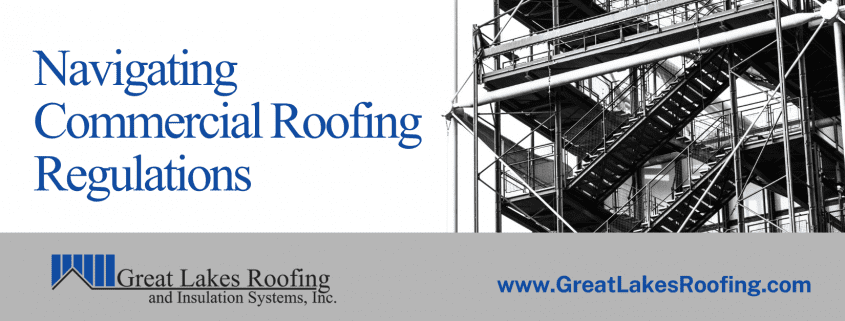As a commercial property owner, you know that maintaining your roof is essential to protecting your investment and ensuring the safety of you, your employees and your business! But with a complex web of regulations and codes to navigate, complying with all the requirements can seem daunting.
In this blog post we’ll introduce you to the major players in commercial roofing regulations and compliance in Michigan, to help you make informed and compliant decisions for your next roofing project!
Understanding the Key Players:
Michigan Department of Licensing and Regulatory Affairs (LARA): LARA) is the state agency that oversees licensing and commercial roofing regulations in Michigan. LARA requires roofing contractors to obtain a license before they can perform any roofing work on a commercial building. To obtain a license, roofing contractors must pass an examination, pay a fee, and meet certain educational and experience requirements. LARA also enforces the state building codes, which are based on the International Building Code (IBC) developed by the ICC. LARA conducts inspections, investigations, and audits to ensure that roofing contractors comply with the state building codes and other laws and rules. According to LARA, all roofing contractors working on commercial projects exceeding $5,000 must be licensed by the state of Michigan.
In addition to LARA, we work with the city of Sault Ste. Marie to ensure we have proper permits for every project! The city expects even more construction this year!
International Code Council (ICC): The International Code Council is the non-profit organization that develops the International Building Code (IBC), which serves as the foundation for most state and local commercial roofing regulations in the United States. The IBC is a comprehensive and uniform code that covers all aspects of building design, construction, and performance, including roofing. The IBC is updated every three years to reflect the latest advancements and innovations in the building industry. The ICC also provides training, certification, and resources for building officials, contractors, and other stakeholders.
National Roofing Contractors Association (NRCA): The National Roofing Contractors Association is the trade association that represents the interests and needs of the roofing industry in the United States. The NRCA provides industry standards and best practices for roofing contractors, as well as education, training, and certification programs. The NRCA also advocates for the roofing industry on legislative and regulatory issues, and promotes the professionalism and quality of the roofing industry to the public. The NRCA also offers technical assistance, research, and publications for roofing contractors and other stakeholders.
Michigan Energy Code: The Michigan Energy Code aims to reduce energy consumption, greenhouse gas emissions, and utility costs, while improving comfort, health, and safety for building occupants. It’s not only a legal requirement, but also a smart investment for the future of Michigan. According to a study by the Midwest Energy Efficiency Alliance, the minimum requirements of the code can save an average of $230 per year on energy bills for a typical new home, and $1,200 per year for a typical new commercial building.
Fall Protection: Fall protection is mandated by the Occupational Safety and Health Administration (OSHA), which is the federal agency that regulates workplace safety and health. OSHA requires roofing contractors to provide fall protection for workers on roofs with a pitch exceeding 4:12, which is the ratio of the vertical rise to the horizontal run of the roof. Fall protection can include personal fall arrest systems, guardrails, warning lines, safety monitors, or covers.
Navigating commercial roofing regulations and staying in compliance might seem like a daunting task, but we have decades of experience and are ready to help you map a course towards a successful roofing project! Give us a call today for a free quote!

